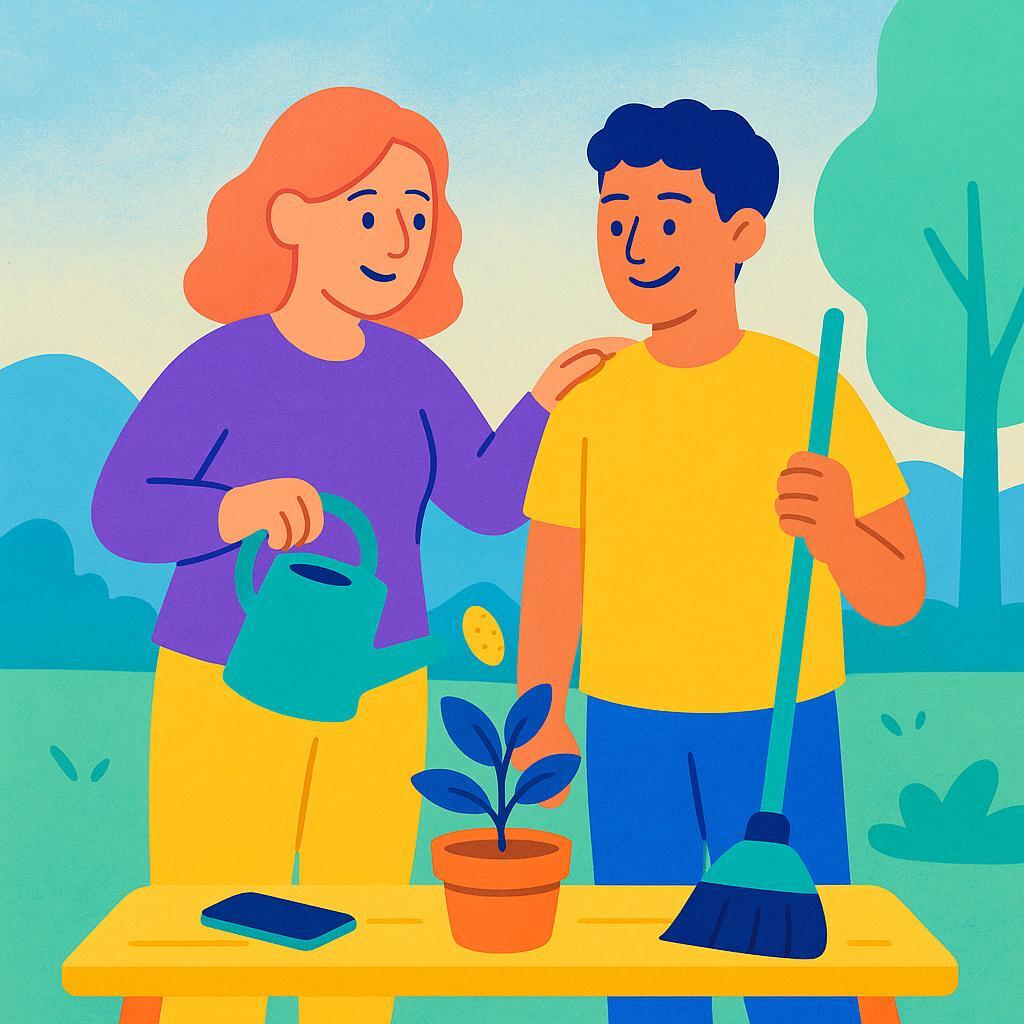Checked Out Kids: Turning Screen Fatigue Into Real‑World Resilience
It’s not just your house — teens everywhere seem to be scrolling themselves into a stupor. A new survey out of New York finds that more than three‑quarters of parents believe their teenager would benefit from some kind of mental‑health support, and two‑thirds have seen more anxiety or sadness in the past year. Most mums and dads in the study blamed technology: 68 per cent said constant phone and gaming time has hurt their child’s social and emotional well‑being, with irritability, late‑night doom‑scrolling and hiding away in their bedrooms topping the list of side effects. Fully 89 per cent thought more fresh air and hands‑on experiences could help kids rediscover confidence and independence.
The concern isn’t about having a phone so much as being unable to put it down. Researchers from Weill Cornell Medicine and Columbia University recently followed more than 4,000 nine‑ and ten‑year‑olds for four years. They found that teens who developed a pattern of addictive screen use — feeling distressed without their device or using it to escape problems — were roughly twice as likely to report depression, anxiety or even suicidal thoughts. Simply counting hours didn’t predict which kids struggled; quality of engagement mattered most. In other words, the endless social‑media feed isn’t just gobbling up time; it can rewire a young brain to crave constant distraction.
So what’s a parent to do besides prying devices from a clenched fist? Start by naming what’s happening. Talk with your teen about how certain apps make them feel. Be honest about your own habits too — they’re watching. Create phone‑free zones during meals or homework and resist turning every rule into a punishment. The research suggests that a thoughtful family media plan beats a blanket ban.
The other half of the equation is what you add back into their day. Those same parents who are worried about screens also say their kids need more real‑world chores and experiences. A 10‑minute dishwashing sprint, helping plan the weekly shopping on a budget or cleaning up the garden after dinner all count as “screen detox” and life‑skill training rolled into one. We know from research on responsibility that kids who contribute at home build confidence, empathy and a sense of belonging. Swapping doom‑scrolling for mopping the kitchen floor might not win you a popularity contest, but a little dirt under the fingernails is a powerful reminder that their value isn’t tied to a like button.
Parenting through this silent epidemic means modelling balance. Put down your own phone, pick up a broom and invite them to join you. They might grumble, roll their eyes or even post about it, but these shared moments teach them to navigate stress, boredom and responsibility in the real world. When your kid looks “checked out,” the antidote may be less a digital detox and more a chance to get their hands busy, their bodies moving and their hearts connected.
Sources:
- BODA Therapy press release summarising a November 2025 survey of 250 U.S. parents, which found that 78 % believe their teens need mental‑health support, with 68 % reporting negative impacts from technology and calling for more outdoor activities.
- Weill Cornell Medicine news article on a June 2025 longitudinal study linking addictive screen use — not total screen hours — to higher risks of depression, anxiety and suicidal thoughts in teens.
---
النسخة العربية باللهجة المصرية
أنت مش لوحدك – المراهقين فى كل مكان بقى شكلهم بيعملوا سكرول لحد ما دماغهم بتفصل. استطلاع جديد من نيويورك اكتشف إن أكتر من ثلاثة أرباع الأهالى شايفين إن ولادهم محتاجين دعم نفسى من نوع ما، وإن اتنين من كل تلاتة لاحظوا زيادة فى القلق أو الحزن السنة اللى فاتت. أغلب الأباء والأمهات فى الدراسة لوموا التكنولوجيا: ٦٨٪ قالوا إن الوقت الطويل قدام الموبايل والألعاب أثر سلبى على صحة أولادهم الاجتماعية والنفسية، مع العصبية، السهر على الشاشة، والانعزال فى أوضهم ضمن الأعراض. وكمان ٨٩٪ افتكروا إن الخروج للهواء الطلق والتجارب العملية ممكن ترجع لأولادهم الثقة والاستقلال.
المشكلة مش فى وجود الموبايل قد ما هى فى عدم القدرة على تركه. باحثين من جامعة ويل كورنيل و كولومبيا تابعوا أكتر من أربعة آلاف طفل عندهم تسع وعشر سنين لمدة أربع سنين. لقوا إن المراهقين اللى بيطوروا نمط استخدام إدمانى للشاشات – يعنى بيتضايقوا لما ما يكونش الجهاز فى إيديهم أو بيستخدموه للهروب من المشاكل – كانوا معرضين ضعف غيرهم تقريباً للإصابة بالاكتئاب والقلق وحتى الأفكار الانتحارية. عدد الساعات الوحده ما كانش هو اللى بيحدد مين بيعانى؛ طريقة الاستخدام كانت الأهم. بمعنى إن السوشيال ميديا مش بس بتلتهم الوقت، دى بتعاد تشكيل مخ المراهق عشان يشتاق للتشتيت المستمر.
نعمل إيه غير إننا نشد الموبايل من إيدينهم بالقوة؟ ابدأ بإنك تسمى المشكلة. اتكلم مع ابنك عن إحساسه بعد استخدام التطبيقات المختلفة. اعترف بعاداتك أنت كمان – هم شايفينك. اعمل مناطق خالية من الموبايل وقت الأكل أو المذاكرة وحاول ما تحولش كل قاعدة لعقاب. الأبحاث بتقول إن خطة عائلية مدروسة لإدارة استخدام الشاشات أحسن من منع شامل.
النص التانى من المعادلة هو اللى تزوده فى يومهم. نفس الأهالى اللى قلقانين من الشاشات بيقولوا إن أولادهم محتاجين مسئوليات وتجارب حقيقية أكتر. غسل الصحون عشر دقايق، المساعدة فى تخطيط مشتريات الأسبوع بميزانية، أو تنظيف الحديقة بعد العشا كلها تعتبر «ديتوكس» من الشاشة وتدريب على مهارات الحياة فى نفس الوقت. الأبحاث بتقول إن الأولاد اللى بيشاركوا فى شغل البيت بيكبر إحساسهم بالثقة والتعاطف والانتماء. تبادل تصفح الأخبار بكحت البلاط يمكن ما يخليكش الأب المفضل، بس شوية تراب تحت الأظافر بيذكرهم إن قيمتهم مش مرتبطة بزرار الإعجاب.
التربية فى وسط الوباء الصامت ده يعنى تكون قدوة فى التوازن. سيب أنت كمان موبايلك، امسك المقشة وخليهم يساعدوك. يمكن يزمروا أو يتقلبوا عليك أو حتى ينزلوا بوست عنك، لكن اللحظات دى بتعلمهم إزاى يتعاملوا مع الضغط والملل والمسئولية فى الحياة الحقيقية. لما تلاقى ابنك «فاصل»، العلاج مش بالضرورة منع الشاشة بس؛ ممكن يكون فرصة يشتغل بإيده، يتحرك بجسمه ويربط قلبه بيك.







Leave a Reply
You must be logged in to post a comment.